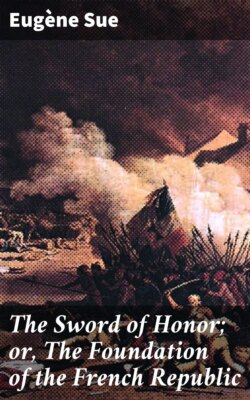Читать книгу The Sword of Honor; or, The Foundation of the French Republic - Эжен Сю - Страница 3
На сайте Литреса книга снята с продажи.
INTRODUCTION.
ОглавлениеTable of Contents
I, John Lebrenn, the son of Ronan, whose father was Alain, the last son of Salaun Lebrenn the mariner, now take up the thread of our family history, by writing the following narrative.
Thanks to God, Oh, sons of Joel! my eyes have seen the beautiful day predicted to our ancestor Scanvoch the soldier by Victoria the Great, now more than fifteen centuries ago, and awaited from age to age by our family. I have witnessed the solemn judgment, the expiatory punishment of Louis Capet, called Louis XVI, the last of that line of Kings of Frankish origin. Rejoice, ye shades of my ancestors—ye martyrs of the Church, of the Nobility, and of Royalty! Rejoice, ye obscure soldiers who fought in the bloody conflicts that you engaged in from age to age, in resolute insurrections of the oppressed against the oppressors of centuries—of the sons of the conquered Gauls against the conqueror Franks! Rejoice! Old Gaul has recovered her ancient republican freedom! She has broken the abhorred yoke of the Kings, and the infamous yoke of the Church of Rome.
I am writing this narrative in the year II of the French Republic, one and indivisible.
My great-grandfather, Salaun Lebrenn, died at Amsterdam in his ninety-first year, on December 20, 1715. His son Alain, born in 1685, was then thirty years of age. He worked in Amsterdam as a printer, one of the most lucrative trades, in that the large number of books, then being written against the Church and royalty, could be published only at Geneva, or in Holland, free countries in which the right of intellectual free research was recognized and protected. My ancestor Alain sold in 1715 the modest patrimony which he inherited from his father Salaun, left Holland, and settled down in France at the beginning of the Regency under Louis XV, the successor of Louis XIV. The freedom then enjoyed was great compared with conditions at the period of Louis XIV. Being exceptionally skilled at his trade, my grandfather secured the position of foreman in the printing house of one of the descendants of the famous Estienne, in whose establishment our ancestor Christian was long employed. Alain married the niece of his employer. Of that marriage was born, in 1727, my father Ronan. He followed my grandfather's trade. The latter died in 1751. My father had two children—my sister Victoria, born in 1760, and myself, John Lebrenn, born in 1766.
My grandfather's life was spent in peace and obscurity. But great misfortunes fell upon our family. As you will read in the course of the following history, Oh, sons of Joel! it was not vouchsafed to my father to witness, as I did, the brilliant victory that crowned fifteen centuries of incessant, painful and bloody endeavor, thanks to which our ancestors—successively slaves, serfs and vassals—conquered, at the price of their lives and of innumerable rebellions, step by step, one by one, the franchises that the French Republic has now confirmed and consecrated in the face of the whole world, by proclaiming, in the name of the Rights of Man, the downfall of Kings and the sovereignty of the People.
